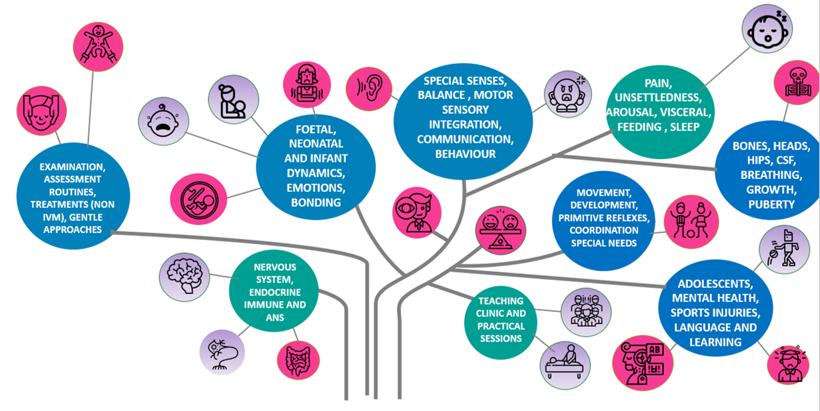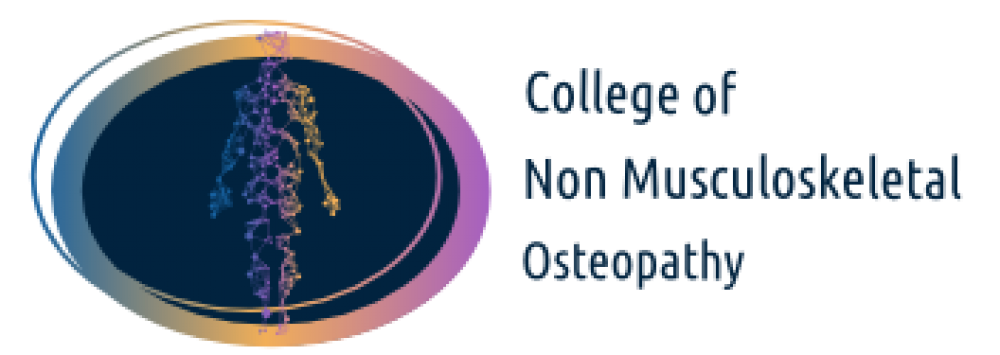Caroline delivers all the lectures, practical and clinics in person, with very small groups – capped, to allow a masterclass style focused teaching experience
COURSE FEES ON SALE! Paeds Certificate in 2024-2025 – £2500
See free introduction / orientation video to the programme, plus a free CPD webinar on infant feeding / breastfeeding, at bottom of page – as indicative content!
THREE VERSIONS TO CHOOSE FROM:
- FULLY F2F – on person lectures (emodule to guide you through the assessments and you get an online resource package for long term ongoing learning / revision). This version has lectures and clinics in Bristol. Read more here….
- Hybrid – online lectures, released monthly, with zoom tutorial support, and a one week block clinical attendance. Read more here…..
- Online only (huge resource base and guided progression. Read more here….
- FROM THE PAEDS PROGRAMME YOU GET:
- fantastic and extensive library of video resources
- loads of evidence based clinical insights and osteopathic approaches
- lots of techniques and direct hands on guidance
- attendance at the Bristol teaching clinic – see patient interactions, learn assessments approaches, observe / participate in treatments
- lots of technique insights, all common presentations covered
- red-flags, consenting, communication and general clinical guidance and referral considerations included
- not dedicated to ‘cranial / IVM’ – uses general, gentle osteopathy – suitable for all practitioners, regardless of experience.
- you can do this course and then be able to being your paediatric practice in your own clinic. No prior experience required.
- THIS COURSE IS VERY EXTENSIVE, TAKES A LOT OF EFFORT, BUT IS TOTALLY WORK THE INVESTMENT OF TIME, ENERGY AND FOCUS – this is equivalent to 2 years packed into one!
- you retain long term access to the learning resources
Use the bank details to make a transfer – info in the forms and fees page / section, and then email us on admin@ cnmo.co .uk with the completed relevant forms (on the forms and fees page). Please contact us if you want to pay by card.
*******************************************************************************************************!
Hybrid programme: – 9 modules per year (equivalent to 9 full weekends of lectures each module), 6 clinical observations / practical days per year (over 3 weekends or a 6-day block), lots of extra online resources and additional lectures, regular zoom meeting and group forum chat support. In person events and clinics are hosted in Bristol.
Scientific rationale Underlying evidence
Critical appraisal of osteopathic approach
Troubleshooting clinical cases
Risk assessment complex cases adjuncts / exercises / self care time for hands on support, for clinical observations
Ongoing monthly zoom meeting support and group chats / forums for communication and interaction.
Certificate – all modes of delivery cover the same material:
This is year one of the programme – and you can exit at the end of year one, to consolidate your practice before progressing to year two if you wish. After year two (a more in-depth walk through of paediatrics across the lifespan, evidence frameworks and research dynamics) you will be awarded the DIPLOMA.
This is a wide ranging and highly detailed programme covering a range of the most common paediatric conditions presenting to osteopaths and comparable manual therapists, as well as covering pathology, risk factors, communication, red flags, developmental dynamics and much more.
The developmental, learning and growth challenges for children can be considerable and whilst many infants, toddlers and older children sail wonderfully through their early years, for many, it can be a distressing, awkward or traumatising period. No one wishes to see children suffer unnecessarily, and many issues arise through poor coordination, weaker muscles, poor posture, illness and injury. A gentle hands on approach can be key to helping children navigate childhood with the fewest negative effects possible!
This is very extensive, evidence backed programme, which aims to take you from where you are to a deeper level. Helping to rationalise your clinical approaches, to explore the neuroscience, physiology, anatomical dynamics and function of paediatrics, development, growth and social engagement are key components of this course. You don’t need to know any ‘cranial’ / involuntary mechanism work to engage with paediatrics – although if you do there is still plenty in this course which will inform your personal technique style. But, the course is designed to develop clinical protocols from first principles – and then to determine how children can be helped. All elements of common presentations across paediatrics from infants to adolescents, and this programme covers core elements of this things you will need to explore this field of care in more depth and with greater clarity.
Programme aims
CERTIFICATE SUMMARY:
- ANATOMY AND PHYSIOLOGY
- AUTONOMICS, NEUROENDOCRINE, HPA, IMMMUNE AND SOMATOVISCERAL INTEGRATION
- MICROBIOME AND IMMUNE CONSIDERATIONS IN CHILD DEVELOPMENT
- INTRA-UTERINE ISSUES
- BIRTH, BONDING, BREASTFEEDING, ORAL FUNCTION, DIGESTION AND BREATHING, unsettledness and general health
- DEVELOPMENT OF POSTURE, MOVEMENT, COORDINATION AND BALANCE, REFLEXES
- CHANGING ANATOMY OF THE HEAD, BODY AND TORSO, STOMATOGNATHIC INTEGRATION
- CHANGING SHAPE AND TORSION IN MUSCULOSKELETAL FACTORS AND INTRAOSSEOUS STRAIN
- ONLINE PLATFORM AND TUTORIAL SUPPORT
KEY SKILLS AND PRACTICE APPROACHES COVERED:
- CLINICAL ASSESSMENT REVIEW = CONSIDERING ALL THE FACTORS WITHIN THE CERTIFICATE CURRICULUM AND TAKING THEM TO THE NEXT LEVEL:
- MANAGEMENT OF VARIOUS CONDITIONS EG feeding and latch dynamics, plagio and movement disorders, unsettledness, coordination, EENT function, bladder and bowel dynamics, orthopaedic, neurodiversity and body image dynamics. NB, these are all introduced at Certificate level, but are now reviewed much more critically.
- CLINICAL PROTOCOLS – WHAT THEY ARE AND ARE NOT
- OUTCOMES ASSESSMENT
- UNDERSTANDING ORTHODOX MANAGEMENT AND INTERDISCIPLINARY ISSUES, imaging, diagnostic criteria, screening
- PRACTICAL TECHNIQUE INTENSIVE CLASSES
- TUTORIAL SUPPORT
- EXTENSIVE EVIDENCE REVIEW AND CASE ANALYSIS
- HELPING YOU WORKSHOP COMPLEX PRESENSTATIONS
- DEVELOPING YOUR PERSONAL CLINCAL PROFESSIONAL FIELD OF CARE
- ONLINE PLATFORM AND TUTORIAL SUPPORT (PLUS ABOVE PRACTICAL SESSIONS)
- CLINICAL OBSERVATIONS
THIS PICTOGRAM REPRESENTS THE CONTENT OF THE CERTIFICATE

Check out this free CPD video discussing the type of content available in this programme!
WHOMBS:
After either the certificate or the Diploma you can join whombs.com, which is a practitioners support group and a public information website / service (which is being built up gradually), to support you and the public to know more about osteopathy and women’s health, and care of infants and children.
Whombs is open only to registered osteopaths (in your country of practice).




